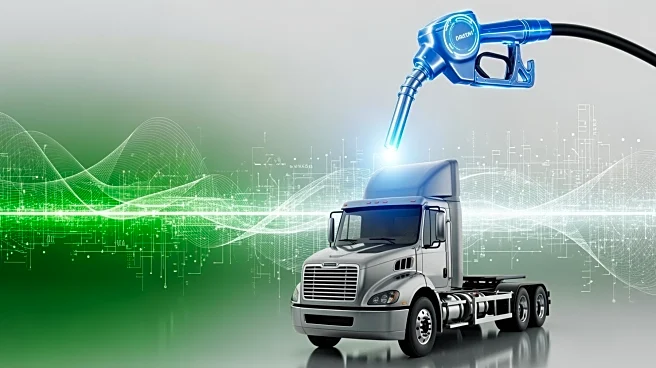What's Happening?
Fleet drivers and dispatchers are adopting various strategies to improve diesel fuel economy, as highlighted in a recent study. The national average for miles per gallon (mpg) is 6.91, but some fleets have achieved an average of 7.7 mpg, with certain
drivers surpassing this figure. The Run on Less – Messy Middle initiative showcased impressive results, with two diesel trucks averaging 11.6 mpg over 22,550 miles and another truck running on 99% biodiesel achieving 9.5 mpg over 5,418 miles. Key practices contributing to these results include optimizing truck specifications, adjusting driving speeds, and strategic routing to avoid congestion. Drivers are encouraged to maintain safe following distances to minimize frequent braking, which can lead to fuel inefficiency. These measures can result in a 3% to 5% improvement in fuel economy, translating into significant cost savings.
Why It's Important?
Improving fuel economy is crucial for fleet operators due to the high cost of diesel fuel, which is a major expense for owner-operators. Enhanced fuel efficiency not only reduces operational costs but also benefits the environment by lowering emissions. As fleets strive to achieve better mpg, they contribute to sustainability efforts and reduce their carbon footprint. The strategies employed by drivers and dispatchers can serve as a model for other fleets aiming to optimize fuel usage. This focus on fuel economy aligns with broader industry trends towards efficiency and environmental responsibility, potentially influencing policy and practices across the transportation sector.
What's Next?
Fleet operators may continue to refine their strategies for fuel efficiency, potentially adopting new technologies or practices that further enhance mpg. As awareness of the benefits of improved fuel economy grows, more fleets might participate in initiatives like Run on Less to benchmark and share best practices. Additionally, advancements in biodiesel and other alternative fuels could offer new opportunities for fleets to reduce costs and emissions. Stakeholders, including industry leaders and environmental groups, may advocate for policies that support these efforts, encouraging wider adoption of fuel-efficient practices.
Beyond the Headlines
The push for better fuel economy in fleets highlights the intersection of economic and environmental interests. As fleets adopt more efficient practices, they contribute to a cultural shift towards sustainability in the transportation industry. This movement may inspire innovation in vehicle design and fuel technology, leading to long-term changes in how goods are transported. Ethical considerations, such as the responsibility to reduce environmental impact, may become more prominent in industry discussions, influencing corporate strategies and consumer expectations.

















